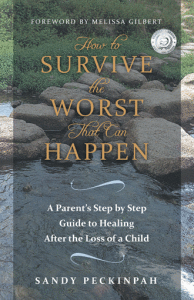From time to time in this space, Balboa Press publishes articles written by our authors in which they share some aspect of their self-publishing journeys. These are the words of Sandy Peckinpah, author of , “How to Survive the Worst That Can Happen”, finalist in the 2014 USA Best Book Awards in the Health: Death & Dying category. You can find out more about Sandy and her book on her website, www.sandypeckinpah.com, Facebook and Twitter. Download the Balboa Press free publishing guide to receive more information on self-publishing your book with Balboa Press.
Often, when I tell people I’m an author, the response is… I’ve always wanted to write a book, but I just don’t know where to begin!
The truth is, everyone has a story, and everyone’s story has the potential to offer value and impact on the world. What holds us hostage is the inability to commit to writing until something happens that is so profoundly life changing, it can no longer lie dormant as a desire; it becomes a demand.
 My husband was a television series writer and our idea of a romantic evening was sitting on our patio creating characters and storylines long after the children went to bed. For years I was on the fringes of being a writer, but had never written anything on my own.
My husband was a television series writer and our idea of a romantic evening was sitting on our patio creating characters and storylines long after the children went to bed. For years I was on the fringes of being a writer, but had never written anything on my own.
Most writers will tell you there was an event that ignited their fire to write. For me, that flash point came when my desire to tell my story was a need greater than my own.
The event was the tragic loss of my son. On that day, a friend showed up at our home with a book in hand. It was a story written by a mother who’d lost a child. That book was my lifeline. I knew if she could survive, so could I, and one day I’d write about it.
That very night, I picked up my pen and wrote in my journal, “My son died and my life will never be the same.” I could only write those 11 words, but that one sentence was the beginning of healing and the birth of my story.
The transition from thinking of writing to actually becoming a writer is a process, and it begins with that first sentence. Uncover your first sentence, and you’re on your way to telling your story. You are already a storyteller… everyone is, you just need to sit down and start writing.
Here are a few of my writing secrets:
- You don’t have to write your book in sequence. I often jumped into the middle chapters before writing the beginning. This is the greatest antidote to writer’s block!
 Be prepared to capture ideas at all times. Keep 3×5 cards in your car, in your bathroom, and at your nightstand. Unless you write it down, you’ll forget.
Be prepared to capture ideas at all times. Keep 3×5 cards in your car, in your bathroom, and at your nightstand. Unless you write it down, you’ll forget.- Consistency is key. Schedule your writing time in your calendar. I wrote after work, 5 days a week from 4:00-8:00.
- Give yourself a completion date. Stick to it by scheduling a reward; perhaps a trip somewhere!
- Rituals are triggers for inspiration. I begin my writing process by preparing a cappuccino and playing opera music. From that point forward, words flow.
- Map out your story arc: Who you were before (the beginning), what happened that changed you (the middle), and who you are today (the end).
- Don’t question how good you are as a writer; question how you’re changing the reader’s life.
- Allow yourself to be vulnerable. Vulnerability is the most powerful tool you have in processing your life! It’s also the best connection to your reader’s heart.
Dr. Viktor Frankel said: “In some ways suffering ceases to be suffering at the moment it finds meaning.” I realized my story had the power to offer comfort, guidance, and the promise that bereaved parents would be able to feel joy once again. I had transformed my suffering into meaning the day I began writing my book.
Your story has the potential to change one life, or many. It all begins with writing that one sentence. Commit to doing that, and a year from now, you’ll look back and realize just how powerful this moment really was.
Balboa Press authors who’d like to share a 350-600 word experience related to the self-publishing of their books, are invited to do so by sending a message through our Facebook page at www.facebook.com/BalboaPress, by tweeting us @BalboaPress, or by emailing dghosh@ balboapress.com. We may not be able to use every story, but we will read and consider them. Balboa Press reserves the right to edit stories for content, grammar and punctuation accuracy; as well as for space.
Thanks, Sandy, especially for #7. Reminding me of two things– to read my writing not only as the writer but also as the reader; and how much writing my book is changing my life first, before it even gets shared with anyone else. xo
Cat, thanks so much for your comment on my guest post for Balboa. I was out of the country when you wrote, and I missed seeing your comment! I have learned first hand that number 7 is the beautiful synchronicity that happens between writer and reader. Thanks so much for pointing that out!
Sandy! You make it okay for us to be honest in our writing expression; that we need no be eloquent, only sincere and THAT we all know how to do! Very concise and simple tips, you make me feel that writing or being an author is no longer a lofty goal!
Veronica, you, of all people, have the ability to write your book! You give beautiful thoughts in words every day to your greeting cards!
This is the most useful and succinct list of first steps in beginning to write that I have ever read–and I have read suggestions “On Writing” from authors as diverse as Mark Twain and Joan Didion! Thank you, Sandy, for making it appear possible to start!
Adelaide! Thanks so much for your wonderful comment and acknowledgement! I missed it, until now, I was traveling 🙂 Your words make me feel like a million bucks!
Pingback: My Paris Awakening — Sandy Peckinpah